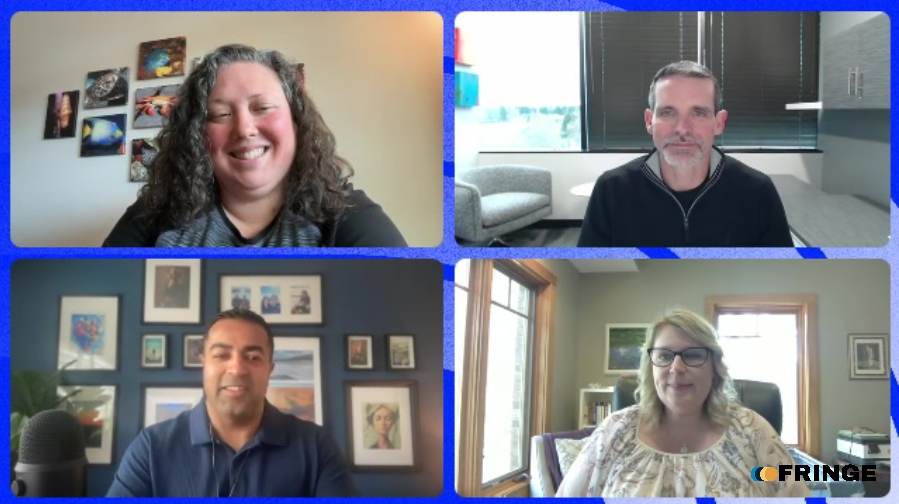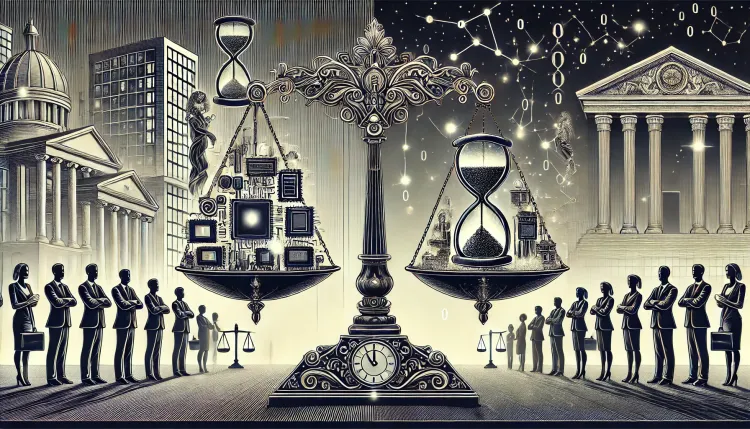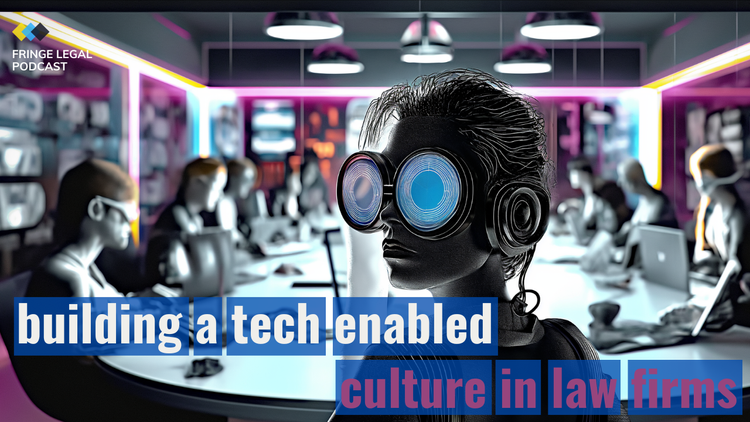Alice Stephenson on breaking down barriers
SUBSCRIBE AND REVIEW: iTunes // Spotify // Pocket Casts // Stitcher
Alice Stephenson is a founder and tech lawyer driving inclusion and innovation in law and promoting individuality within the legal profession.
Alice founded Stephenson Law in 2017 to create a law firm that does things differently. Tackling each stereotype head-on, she is on a mission to build a forward-thinking, innovative law firm that puts people at the heart of everything it does.
Alice’s goal is to inspire young women to challenge the perceived barriers to success and see that anything is possible.
In this episode we discuss:
07:23 – Problem-solving
11:00 – Self-reflection and being comfortable with mistakes
13:57 – Client experience
18:27 – Measuring lawyer value outside of billable targets
22:44 – Breaking down barriers
Alice Stephenson – Breaking down barriers
Ab: [00:00:00] Hello everyone. And welcome to the Fringe Legal podcast. I am thrilled to have Alice Stephenson as my guest today. Alice is the founder and a tech lawyer driving inclusion and innovation in law and promoting individuality within the legal profession. Alice founded Stevenson law in 2017 to create a law firm that does things differently.
Alice’s goal is to inspire young women, to challenge the perceived barriers, to succeed and see that anything’s possible. We’ll dig into much of that today, but before we get started, I thought it’d be helpful to give a little bit of a background of Alice’s story if you haven’t come across it already.
So Alice is probably not the person you would imagine when you think of a lawyer and a law firm owner.
She had her first child at 18, and despite conventional wisdom qualified as a lawyer nine months after having her second child and the theme of nine months continues, because nine months after having her third child, she founded Stevenson Law and the firm is doing wonderfully. They won, Botique Law Firm of the Year 2020 .
And yeah, I’m really thrilled to have Alice on the show because I came across her on LinkedIn through one of her posts where she talks about all of the different barriers. She had to break down to enter the legal profession. And I know plenty of people for whom that actually becomes a hurdle.
They haven’t been able to overcome for many reasons. So I thought it was important to have a discussion around that. Alice, thank you so much for coming on the show.
Alice Stephenson: [00:02:27] Hi, thank you for having me.
Ab: [00:02:29] Yeah. And I know you’re based on the other side of the world. You have a very English accent, but you’re in Amsterdam.
So hopefully the canals and the cycling and everything else is treating you nicely.
Alice Stephenson: [00:02:39] Yes. Yes. Thank you.
Ab: [00:02:42] So there’s really three things I wanted to try and cover today. We’ll start with something that relates to your story. You talk a lot about breaking down barriers. And as I mentioned in the prelude, that’s how I came across you.
You’ve been, let’s call it outspoken on LinkedIn and rightly so around how to make the profession less gray and more individual and helping people to bring about their personality. We talked about tattoos and you’ve talked about tattoos in the past and I have a whole back full of tattoos so I certainly admire that.
And you’ve talked about how being a woman or having kids at an early stage, and basically how all the challenges you had to overcome to get to where you are. Talk to me where you are today with that and how that shaped your journey into the legal profession.
Tackling challenges [00:03:29] Alice Stephenson: [00:03:29] Sure. I think we all have so many challenges and obstacles that we come up against whatever path we choose.
But I guess we all have slightly different ways of dealing with them and approaching them. I think they’re my biggest obstacle has always been having a child at such a young age. I was only 18 when I had Lydia. And that was obviously a massive obstacle to starting a career, to getting to getting my first degree.
Obviously, having her has been one of the most wonderful things in my life, but there’s no doubt that it’s certainly made some things a lot harder particularly cause I didn’t have a lot of support at the time. So I think I launched into adulthood with a pretty big problem that I needed to deal with like how was I going to support myself and support my child and make something of myself . And I had to get on with it really. I just, I tackled it a bit, like just a problem. If I want to get a job, that’s gonna pay me a decent salary, then, convention dictates that the best way of doing that is to get a degree, to get education.
So I was followed a process really, and figured out the best way that I was going to be able to do it, which university I went to, which course I went to, how I was going to pay for that, all of the different parts of the puzzle, and then fitted them all together. And I’ve applied that logic to all of the problems that I’ve encountered ever since then.
So when I applied to getting a training contract I had a problem because I didn’t get very good A-levels because when I take my A-levels, I was seven months pregnant and obviously lots of law firms still take A-levels into account. That made things a lot harder and I had to find this way around that.
And then starting my own firm. So many people told me that I wasn’t going to be able to do it. They were going to be, there were so many reasons insurance was going to be too expensive or I wasn’t even going to be able to get insurance. I wasn’t going to be able to get authorization from the SRA.
I wasn’t going to be able to find any clients. I wasn’t going to have to find anyone to work for me. I wasn’t gonna be able to make any money, honestly the list was endless and I could have quite easily have just thought, Oh, do you know what this sounds like far too much effort required – I’m not going to bother.
But I think it, that’s not really the way that my brain works. I look at each part of it as an individual problem and try and solve that problem and break it down into small chunks. And what happens is when you do that, actually it does so fall into place and you move along one small step at a time. But when you look back, you actually realize how much you’ve achieved just by doing it like that.
Ab: [00:06:26] There’s so many things that you’re saying, some of which I can definitely relate to because just getting into law school, getting into university. It’s a challenge and you have to keep going. Sometimes you do have to problem solve.
And the law firm point is so interesting because I know so many tech company founders, and generally the message that they get, across the board, is not that, Oh, don’t do it right? It’s almost a Silicon Valley culture of you should do it, just jump in it’s okay. It will be difficult, no one argues that it’s going to be difficult, but you can figure it out. But for law and FinTech and a lot of these kinds of quite heavily regulated professions it’s almost as a hindrance for new entrance. And then we have this conversation, Oh, the profession is not changing things. Aren’t changing. They’re the same. And there is a very real link to you keep discouraging people from coming in and trying new ideas. Why do you think things will change?
Problem solving
[00:07:23]
I’m sure things, as you’ve been progressing with the firm, having just got magically easier. So how do you tackle challenges today? How do you think about them now? Because I think probably I’m making this assumption that the types of challenges and the problems you’re looking to solve today are probably quite different to when you were 18.
But is your methodology kind of similar or are you thinking about problem solving in a different way?
Alice Stephenson: [00:07:46] I think fundamentally I’m still the same person and I still largely have the same approach, but I’ve learned so much over the last 20 years.
And obviously that does affect the way that I approach problems. I think some of the key things that I’ve learned are that I can’t do everything myself. I’ve always had this drive to be fiercely independent and to show people that I’m very capable and there’s almost this kind of feeling that if you rely on other people, then that’s somehow a poor reflection on you.
But one of the things I’ve really learned over the last couple of years is that you need other people you can’t do it all yourself. You can’t know everything yourself. It’s just not possible. And actually there are so many people out there that can do stuff that’s way better than you could possibly do it.
It’s really important, I think, to be able to self-reflect on the things that you’re good at, the things that you’re not good at and to build a team around you. Whether you’re running a business or even just in your personal life, whatever it is that you’re doing, you still need that support network around you, and you still need people to be able to help you in the areas that you’re not so strong at.
I definitely now more so than I did in the past, rely on my support network a lot more when I’m making decisions. And I guess as I’ve got older, I’ve probably become a little bit less impulsive about making decisions. And I have to be now, I’ve got a reasonably sized business considering where it’s come from.
And I’ve got three children, I’ve got, lots of people are dependent on me. And I’ve got a responsibility to them to do what’s in their best interest. I’m definitely less inclined to rush into decisions. Although I’m still very much led by my gut. I’m definitely a very sort of instinctual person.
I have strong instincts and my gut doesn’t normally let me down. But it’s a kind of assessment now of this is what my gut’s telling me. This is what the facts are telling me. This is what. The people around me that know more than I do are telling me. I’m putting all of that together and deciding what’s the best, what’s the best thing to do in this situation?
Ab: [00:10:08] Yeah.
I’m always really fascinated around. How people make decisions and your points about self-reflection. I have arguments with my wife , because she’s the same way, where she’s I make decisions from my instincts and my gut. And this is where I put my sort of scientists hat on and say that’s great so do most people, but I like to be able to validate them. And I guess like sometimes as, I’ve matured and learnt a bit more, it’s the same thing they just called mental models, but it’s the same sort of thing, where I like to hone in, even if I’m making a gut decision. On reflecting on it. Why did I lean that way? What was the reason that led me to that? That’s just me personally, but because similar to you, I try not to be super impulsive, but there are times where you’d need to be able to make a decision without needing to spend, days thinking about it or hours thinking about it.
Self reflection and being comfortable with making mistakes
[00:11:00]Yeah. As you think about self-reflection, I’m just curious, how what’s your process? Do you have a process how do you get through sort of those reflection points?
Alice Stephenson: [00:11:09] Yeah. I think exercises is a really important part of my life and way of de-stressing and clearing my mind, I think in terms of what prompts me to self-reflect I think, I’ve made quite a lot of mistakes over the last three years, three and a half years since I started my business things haven’t gone the way that I’ve wanted them to go.
And I think. I think it’s really important that every time that happens, I reflect on what’s caused this to go wrong. And what’s my part been in that we can’t all make the right decisions all the time, because obviously, with the benefit of hindsight, that’s a wonderful thing.
It’s not so much about kind of beating yourself up and thinking I should have known that was the wrong decision when I made it, but I think there’s still always things that you can learn from it. So like recruitment has been a massive learning curve for us. Because I’m quite an instinctual. That kind of fed into my recruitment. And there’s a couple of problems with that. A- I think, I can’t assess somebody’s professional competence through my instinct. I can assess whether I think they’re going to be a good cultural fit for the business.
Whether I think they’ve got the right attitude for what I need, but I can’t assess somebody’s professional skills and competence as a lawyer that way. And I think the other issue with that is that you you’re not taking into account any unconscious bias that you’ve got as well which is obviously really important.
So . And I guess, we’ve had some recruitment decisions that haven’t worked out and then you go back and reflect on why didn’t that work out? And actually our recruitment process is just not good enough. We’re not evaluating people properly. We’re not giving people an opportunity to demonstrate their skills and we’re not making the right decisions.
So it’s that kind of process that we’re working through all of the time.
Ab: [00:13:06] Yeah. And I love that because I imagine as you transitioned from a lawyer, a legal practitioner consultant, all of those things to a business owner, and then as you scale the business, there’s probably a whole plethora of things that you have no experience and probably don’t even know where to begin. Recruitment building your tech stack around you , selecting the right team, knowing who, where you need to expand on it. I know one of the things the firm does differently, maybe not differently, but certainly that stands out to me is you have a social media marketing manager, right?
That’s not really that common within the legal sphere. How do you learn who to hire, what qualities to look for? Because the lawyer lens is probably going to lean you, lead you into a direction that may not be what you want, if you’re trying to set up a different firm. And hopefully that’s a good enough segue to that topic.
Client Experience
[00:13:57]
As you’ve been growing Stevenson Law I know you talk about the firm being different and I imagine it feels different to your clients. What is the client experience like? So if I only as a client, I’ve only experienced “traditional law”, quote/unquote for anyone listening rather than watching, what would coming to you, what would my experience feel like? Will it feel like I’ve just stepped into a startup in the 2010s or feel like a hybrid between, a traditional law firm and a startup. Where would you land?
Alice Stephenson: [00:14:29] Yeah. It’s a really interesting question. It’s probably one that we should actually go out and ask our clients to see what they actually would say about this.
I think one of our USP’s, which has being taken away from us slightly, now everybody is homeworking I think, was the fact that when our clients met us, we are a lot more relaxed that we don’t dress up in suits, we didn’t have formal corporate offices – everything about where we work and what we wear has always been a lot more relaxed.
And that was definitely something that made quite a first impassion for clients when they came and met us. Because it didn’t feel like they were coming to meet a lawyer. It felt like, they were going to chat to, anybody: a marketing agency or, a development agency. But I guess the ethos of what that was all about is still there in the sense that what we’re trying to do, and I talk a lot about breaking down barriers, and there’s a lot of barriers that exist between law firms and clients. And one of those for example, is language. So lawyers like to use a lot of language that the non lawyers don’t necessarily understand unless they went to law school.
And a lot of that language is completely pointless. Doesn’t need to be used and actually trying to communicate in a way that actually just lawyers can understand. It’s just better for everybody. They can understand what you’re saying. You can engage with your clients better. And from the client perspective, it’s a much more enjoyable experience because they know what on earth is going on.
Language is obviously one of them we’re trying to offer our services in a slightly different way as well. So our primary method of providing legal services is through subscriptions. We’re in the process at the moment of developing our different subscription models. Yeah.
But it’s a really exciting opportunity for us. I think, to be able to deliver some legal services in a slightly different, more productize way to our clients, so that they’ve got a lot more transparency around what they’re going to get, how much it’s going to cost them, who they’re going to be working with and seeing us a bit more like a kind of SaaS provider in that sense rather than, rather than a law firm that nobody really understands what is going on or what they’re paying, what they’re paying for all of those things. I think there’s a real lack of transparency typically around that.
Ab: [00:17:13] And I think that obviously shows in the makeup of your team. As I was looking through the other individuals at Stephenson Law, your wider team, you have someone who manages your subscriptions. So at least to me, it’s a strong signal that you take those kinds of things seriously. It’s not just, hey, we’re doing it just because we want to let it be known that we’re doing it.
You actually building processes around that. And that’s super important. The language thing is so crucial because contracting should be more human, generally speaking. And, basically using jargon builds barriers rather than breaks those barriers.
If you want two parties to agree on something, make it as easy for both parties to understand the terms equally without requiring additional help. Of course you need to make sure that it’s still, it offers you the same protections and all of that kind of stuff. But I think it’s certainly achievable, not easy but achievable.
And the transparency point is key. One of the things that gets talked about a lot is that the point about the billable hour, right? On why it’s dying, all of that kind of stuff. And I don’t expect you to just fill all of your secrets around pricing and how you price.
Absolutely not. But.
Measuring lawyer value outside of billable targets
[00:18:27]
How do you think about, in lieu of having billable targets for your lawyers? And maybe I’m thinking more from a culture point of view, because those that are coming in and joining your firm as a fear there. If they’re only used to having billable targets, right?
How did they adjust into having and working with a different model, but there isn’t that number target on their head that you have to achieve 2,800 hours a year or whatever it might be. How do they feel and how do you encourage them to basically link what they do to the value they’re providing to the clients and the revenue and profitability for the business.
Alice Stephenson: [00:19:04] It’s a really difficult question. And I can’t actually claim to know the answer because it’s something that we’re trying to figure out ourselves. And, the billable hour is still really important. The moment we haven’t found a replacement for it . Although, we are trying to step away from it as much as possible when it comes to the way that we’re charging for our work.
But ultimately we’re still a service-based business, and our primary unit is time. So the billable hour is still there.
There are probably three aspects of the billable hour. There’s how do you charge for your time? How do you measure the performance of your lawyers? And, there’s how do you measure the revenue and the profitability and, the internal financial metrics of the business? The billable hour is overused as a performance metric for lawyers. I think too much emphasis is put on it and what we should be doing is taking a much more holistic view over performance.
What we try and do is view it slightly differently. So I think there’s probably three aspects of the billable hour.
There’s how do you charge for your time? How do you measure the performance of your lawyers? And, there’s how do you measure the revenue and the profitability and, the internal financial metrics of the business? The billable hour is overused as a performance metric for lawyers.
I think too much emphasis is put on it and what we should be doing is taking a much more holistic view over performance. I’ve heard so many stories about people being refused, passed over for promotion because they haven’t met a billable hours target. But, they were on secondment for half of the year. So there was just no way that they could have met it. There’s just some ridiculous reason that in no way, reflects on their ability to do their job because they haven’t ticked that box. They’ve hit a blocker. I think that is really wrong. I think there’s also, there’s also the aspect that I think recording and measuring people by billable hours encourages people to be inefficient.
It encourages time them paying it, encourages people to work really slowly. It doesn’t encourage collaboration between the team. I’ve seen it myself when I was in private practice. People hope work because they know that if they give this work away, then they’re not going to be able to meet that target.
Even though they might not be the best person to be doing that work in the first place.
Ab: [00:21:19] As you said at the beginning, just that there needs to be a good replacement, breaking any habit you need to replace it with something. And my concern, because I hear so many of those stories some of what you said, I haven’t come across, but I hear sent me a lot of people overworking.
So again, you’re creating this culture where people almost wear it as a badge of honor: “Hey, I was up till two, three o’clock in the morning working away”. And that’s not okay. Because it’s not sustainable. It’s just not sustainable. Yeah. Fine. If you have to do it, we’ve all done it at some point and it’s okay if you have to do every now and then, but it shouldn’t be something that you’re proud of and it shouldn’t be something as a responsible business, you should be like, great I’m so happy that you’re working 18/19 hours a day repeatedly. And it’s just creating the culture and providing the incentives that drive towards that culture. And at the moment there’s a misalignment there because the things you talked about secondment, and I know you went and you worked for EE and other companies.
I know many people who are all sorts of exceptional, other types of individuals, because they’ve taken secondment, because they’ve spent the time working on client side because you get a fresh perspective. But if you feel as if there’s going to be a penalty for it, because you can’t now hit your target, then you know, many people will not choose that option where actually probably for the long-term benefit of the firm, that’s the thing they should be doing.
Alice Stephenson: [00:22:42] Yeah, 100%.
Breaking down barriers
[00:22:44] Ab: [00:22:44] Perfect. Look, I’m conscious of your time. We have about five or so minutes left. I know you’re very open and visible everywhere. And actually I love that because it allows me to do my research and find out that you’re into CrossFit, that you’re into plant-based lifestyle and all of those things.
I know one of the things that is near and dear to you is how you help certainly young women break down the barriers. So we’ll focus on that audience for now that demographic for the moment.
So yeah, the platform is yours to share your message as much as you want on this, on how to encourage young woman to break down barriers.
Alice Stephenson: [00:23:18] Okay. I think, the primary way in which I’m trying to do that is through sharing my own story, sharing my own thoughts and opinions, challenging perspectives that I think are outdated.
So for example, a lot of the inclusion and equality issues in the legal industry. So trying to challenge those and the people that hold those perspectives. Unfortunately, I don’t have the time to work with people on a one-to-one basis. Although, I’d love to be able to do that one day, but at the moment it’s not something that I can do.
I get a lot of messages from people saying that, just through reading about what I’ve overcome and how I’ve done that the actually that’s really helped them to feel a bit more confident, to not give up hope. Whether it’s trying to find a training contract. I’ve got my blog where I’ve written about, some tips to try and get training contracts or tips to start a law firm.
So it’s just trying to put as much helpful content out there as possible, whether it’s practical tips, whether it’s just a bit of motivation, you can do this, don’t give up, honestly, you can absolutely do this, but it’s talking to people like you as well to help share the message.
And it is, I think, it is working, like you said, I’m quite visible now on social media. And people are picking up on it. And I think that’s great because I do get lots of really lovely messages from people saying that my content does help them. And that’s what it’s all for really.
So that’s really great.
Ab: [00:25:04] Yeah, and I love that you are on so many different networks. I think, is it right that you Stephenson Law was the first law firm, English law firm, to be on Tiktok?
Alice Stephenson: [00:25:15] We do think so. We haven’t been able to find any others. So we’ve claimed that title. And we haven’t yet been challenged on it, so yeah.
Ab: [00:25:23] Fair enough. Yeah. And I think it’s good, right? It shows that sort of, that level of personality that often is missing. And I have to say one of the side effects and the nice things that’s happened since the whole world has gone into lockdown and so on- you get to see a lot more into people’s lives, right?
It’s no longer just a sort of corporate background. I love the fact that people’s calls are interrupted by their dogs or their kids delivering cookies and things of that nature because it’s wonderful. It’s fine. It’s real life. It happens. And it’s really nice to be able to see that. And I did, I sold I think the video that you posted off your PA or assistant, just interrupting your call accidentally and those kinds of things are good.
They’re right. Sometimes you just need a good laugh. Yeah,
absolutely.
For sure. So if people want to find out more about you and what you do I know you said you have a blog that’s probably the best place because I know that links out to all of your socials, all of the articles and things you’ve been featured in is that AliceStevenson.com?
Yes. Perfect. So I’ll link to that. I’ll link to your socials as well. Thank you so much for coming on. It’s been a pleasure speaking to you, and I hope you enjoy the rest of your day.
Thank you.






Become a Fringe Legal member
Sign in or become a Fringe Legal member to read and leave comments.
Just enter your email below to get a log in link.